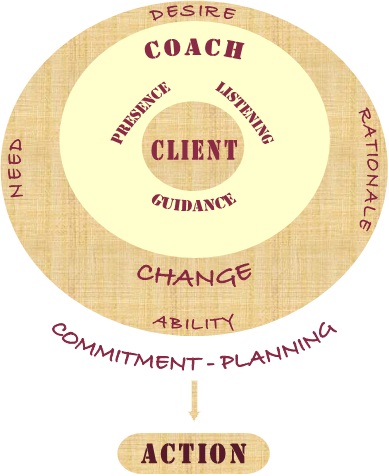A Coaching Model Created by Lorna Poole
(Health & Business Coach, CANADA)
 Health coaching is, at its barest element, about helping people to help themselves to a healthier life. The health coaching experience is oriented to moving the client towards change.
Health coaching is, at its barest element, about helping people to help themselves to a healthier life. The health coaching experience is oriented to moving the client towards change.
The Client
The client is the central focus of the coaching relationship. The client holds the knowledge about himself that is needed to motivate and activate change. The client knows where he wants to go achieve his health goal and knows what is going on in his life that may get in the way. The client is autonomous and self-directed and is the one who must own his health choices.
The Coach
The coach supports her client wholly. She is fully present with the client, encircling him with support as he explores his choices. He feels the safety of the space she is providing him.
The client is being heard. He feels the value of his individuality; this is his voice and the coach is hearing it.
And, when the client loses focus of his story and runs up against the obstacles that prevent making better choices through behaviour change, the coach guides him through the barriers; helping him to achieve awareness and clarity about his issues.
Change
In this supported environment, the client begins to understand his motivation for change. Using the Motivational Interviewing (Rollnick, Miller, & Butler, 2008), the coach seeks evidence of motivation:
The coach accepts and appreciates that these belong to the client alone; that he must own the motivation to change. The coach acts without judgment ~ listening, guiding and being present while coaxing the client gently along his journey.
Commitment
Once the client and the coach have heard the language of change; he is ready to commit to it. The coach moves him towards action and a plan is struck. The commitment is made; the plan is set. The client is ready for action.
Action
The first action is the start of the process for lifestyle change. Many positive actions will combine to make a healthy lifestyle over time. Success in the first action is necessary to create a foundation for the next positive action.
Reference:
Rollnick, S, Miller, WR, & Butler, C. (2008). Motivational interviewing in health care: helping patients change behavior. New York: The Guilford Press.